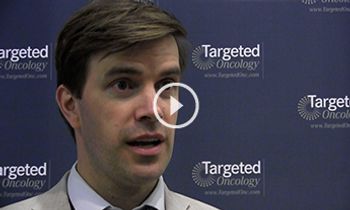
​Renato G. Martins, MD, MPH, discusses why nivolumab is not ready to move up to being a firstline treatment in non

Your AI-Trained Oncology Knowledge Connection!


​Renato G. Martins, MD, MPH, discusses why nivolumab is not ready to move up to being a firstline treatment in non

Geoffrey R. Oxnard, MD, discusses resistance to EGFR inhibitors in patients with lung cancer. Oxnard says resistance to treatment in lung cancer is complex, in that it can change from day to day. He cites one example as patients possibly being resistant to T790M targeted treatments to possibly a MET-related resistance.

Marianne Davies, NP, discusses making patients' oncology team their first line of contact should they develop any toxicities related to receiving treatment. Davies says this is important for patients so that the oncology team can assess whether it is an immune-related side effect, or an issue that can be dealt with by their primary care physician.

A team from the Scripps Research Institute and Bristol-Myers Squibb recently collaborated to collectively develop a method for complete chemical synthesis of antroquinonol and to test the biologic activity of the chemically synthesized product. Contrary to previous reports, the study reported minimal in vitro and in vivo antitumor activity of chemically synthesized antroquinonol A.

The success of the immunotherapies pembrolizumab and nivolumab for the treatment of non-small cell lung cancer (NSCLC), and the promising results in NSCLC for the investigational agent atezolizumab, have generated an interest in new combinations with other agents

A recent study demonstrated that specimens from patients with lung cancer under the age of 50 years appear to be enriched with molecular alterations that are amenable to targeted treatment.

There are no differences in lung cancer incidence or mortality among women of different ethnic groups when adjusted for age, smoking, and other factors, according to an article recently published in the Journal of Clinical Oncology.

Non-small cell lung cancer with mutations in the KRAS gene may be associated with reduced activity of a key endocytic pathway and a mesenchymal phenotype, which may cause metastases.